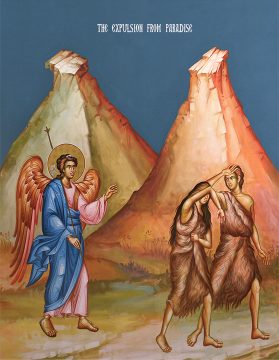Palm Sunday has come, and Holy Week is underway. During these seven days we gather often at the temple, offering back in worship and love a small portion of God’s bountiful gifts to us. From Lazarus Saturday (the day before Palm Sunday) through the Resurrectional Canon and Divine Liturgy at midnight on Pascha, the Church provides seventeen services to attend—at least two per day.

![]() Sometimes as I sit, waiting for the chanting to begin, I think about my Easter experiences before I became Orthodox. The holiday—holy day—featured a solemn Good Friday service, nothing scheduled on Saturday, then Sunday morning, a service devoted to celebrating the glorious Resurrection of Jesus Christ and His triumph over death. Sometimes we gathered to watch a special musical and drama performance. The Easter worship service was a highlight of the year.
Sometimes as I sit, waiting for the chanting to begin, I think about my Easter experiences before I became Orthodox. The holiday—holy day—featured a solemn Good Friday service, nothing scheduled on Saturday, then Sunday morning, a service devoted to celebrating the glorious Resurrection of Jesus Christ and His triumph over death. Sometimes we gathered to watch a special musical and drama performance. The Easter worship service was a highlight of the year.

At this point in the Protestant calendar, though, I never felt as tired as I do now. In my nondenominational experiences, the weeks leading up to Easter might feature wonderful sermon series that pointed our hearts toward the Cross and the Resurrection, as well as a special devotional reading schedule. But Lent was mostly an individualized thing, with people picking ideas from the great smorgasbord of options to find personal meaning in the season.
In the Orthodox Church, however, we speak often of the “journey” of Great Lent, which is then followed by the arduous ascent to the Cross and the Resurrection during Holy Week. Some people take off time from their jobs in order to fully participate; most do not have that option.
For many, this week’s succession of prayers and services are a long walk of obedience, an offering to God in the midst of a desert of family responsibilities and burdens, with no emotional highs to sustain us. We began the Lenten journey with lofty goals of attending each Monday Compline service and bringing a meat-free, dairy-free dish to every potluck meal after the Wednesday Presanctified Liturgy.
But each year by Holy Week we rediscover a hard truth: setting goals and attaining them are two different things. Our energy flags, sickness creeps in, and our ability to deny ourselves wavers. And during these final days before Great and Holy Pascha, we take stock of the season, aware of our many weaknesses and failures.

We did not pray as we should. We were out of time or distracted and worn out.
We were unable to resist a midweek glass of wine after a long and trying day.
When we traveled for work, the fasting guidelines were almost impossible to follow at restaurants and hotels, so we gave up and indulged in a massive cheese binge.
We didn’t give as much to the homeless shelter as we intended, because the refrigerator broke and our 11-year-old son required three new cavities to be filled.
As we consider the three-part Lenten recipe of prayer, fasting, and almsgiving, we realize that we tried and failed on all counts.
And yet…
Isn’t that the point? We have learned yet again that our lives are prostrations in real time: we fall, and by God’s grace we rise; we fall again, and we get up again. The rigors of Lent make us aware of our weaknesses, of our inability to “be good” on our own, to be an invincible island fortress standing against a raging sea of worldly pressures and temptations.


We are not islands, and were not created to struggle alone. The lessons the Church taught us during the preparatory Sundays before Lent come back to us with fresh meaning: God’s incredible love and grace are available at all times—
to the publican who is too ashamed even to lift his eyes to God as he cries out for mercy (Sunday of The Publican and the Pharisee),

to the wayward child who squanders his inheritance from his Father (Sunday of The Prodigal Son),
to the one who sacrifices time and goods for others (Sunday of The Last Judgment),

and to everyone who struggles to forgive as they have been forgiven (Forgiveness Sunday).

Sitting in the flickering candlelight of the evening Bridegroom services during Holy Week, we listen to the readings, which focus on the suffering and opposition that Jesus experienced in the final days before His Crucifixion. The words ask us to consider His parable of the ten virgins with their oil lamps. Five of them were wise, prepared with extra oil to meet the bridegroom for the wedding, and five foolish ones did not bring enough oil. (“Oil” and “mercy” have the same root in Greek; according to the Orthodox Study Bible, “the wise virgins are those who practice charity and mercy in this life, while the foolish are those who squander God’s gifts on themselves.”)

The Church asks us to consider, Are we prepared? Are we ready for the return of Christ?
What about me personally? Have I grown in patience, in love for God, in my efforts to deny myself and serve others? Am I ready?
I’m not sure. I hope so. Progress is not easy to measure; there are no completion certificates in my journey of salvation. But by God’s grace, perhaps I have internalized new habits and a more Christ-centered mindset, with the sorrow of repentance leading to the joy of knowing Christ more deeply.
 Anticipation grows as we approach Pascha. We fall down, and we rise again. All by grace. And next year, we will need to relearn this same lesson.
Anticipation grows as we approach Pascha. We fall down, and we rise again. All by grace. And next year, we will need to relearn this same lesson.
May God grant us continued good strength during the rest of Holy Week as we anticipate the joy of Pascha.
Your honest sharing and helpful words have been a balm for this weary pilgrim. Thank you!
Good strength to you, Melissa, as we ascend this beautiful Holy Week to the Cross, the burial, and the Resurrection of our Lord. With God’s help, we can do this!
Wonderful description of the journey.